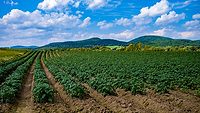USDA, University of Maine Host Workshop to Discuss Remedies for PFAS Contamination on Farms

Image credit: DejaVu Designs via Freepik
The U.S. Department of Agriculture’s Agricultural Research Service’s (USDA-ARS’s) Center of Excellence for Environmental Monitoring and Mitigation and the University of Maine recently collaborated during a three-day workshop to discuss and identify research needs and solutions to address per- and polyfluoroalkyl (PFAS) contamination on farms and in food. The event brought together more than 150 interagency researchers, state partners, university partners, and other subject matter experts.
PFAS contamination is recognized as a challenge to farmers’ continued capacity to sustain healthy soil and water on their farms, and harms farmers’ ability to provide safe and dependable food. In Maine, for example, farmers and lawmakers have previously called on USDA for help shouldering the ramifications of lasting PFAS contamination, as increasing levels of the chemicals have been found in soil, water, animal feed, crops, and livestock on farms across the state.
Long-term roadmap solutions suggested during the workshop include finding new means of detecting when PFAS contamination is a problem, better understanding of how it moves through the agricultural system, and innovating new ways to interrupt that movement or remove the chemicals before they can do harm. Also discussed was a strategy for data standardization and integration, how to develop scientific solutions to manage municipal biosolids, and ways of effectively removing existing PFAS chemicals from the production environment.
Federal and stakeholder workshop attendees plan to move forward with next steps by crafting documents that will communicate solutions to the agricultural research community—especially in locations where PFAS has critical impacts on agriculture—and to engage in partnerships to realize those research solutions into impactful tools and practices for producers and the agricultural community. ARS will continue to expand its research of the chemicals to address their impact on U.S. agriculture.
Looking for a reprint of this article?
From high-res PDFs to custom plaques, order your copy today!







